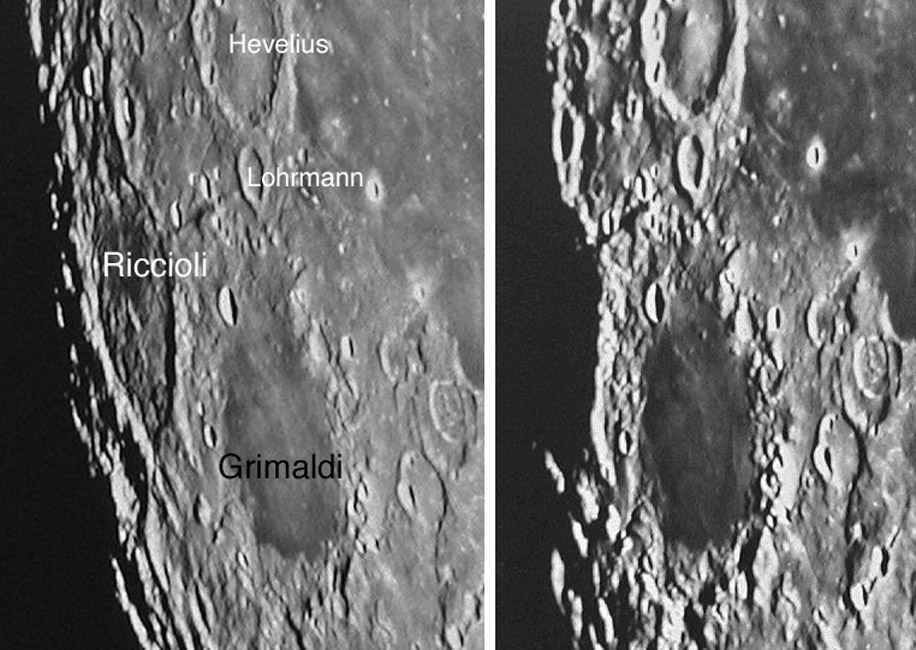Difference between revisions of "December 8, 2008"
| Line 6: | Line 6: | ||
<em>images from [http://www.lpi.usra.edu/resources/cla/ Consolidated Lunar Atlas], sheets E27 (right) and E28.</em><br /> | <em>images from [http://www.lpi.usra.edu/resources/cla/ Consolidated Lunar Atlas], sheets E27 (right) and E28.</em><br /> | ||
<br /> | <br /> | ||
| − | A mysterious feature in this Moon-mappers corner has excited occasional observers for more than 200 years - do you see it? Probably not, but if your read Nigel Longshaw's article in the latest issue of the <em>[http://britastro.org/baa/content/view/74/109/ British Astronomical Association]</em> journal you will be treated to the whole story. From the corner of the "L" in the name on Lohrmann's crater there is a straight feature extending to the rim of Riccioli. Sometimes this feature casts a shadow showing that the terrain is higher on its south side. In honor of Sakuzo Miyamori, a Japanese amateur who observed it in 1936, the feature has been informally called Miyamori's Valley. As Nigel points out this is a misnomer, for it is really not a valley, but just a straight boundary between higher and lower terrain. The lower level material is smooth, probably being fluidized ejecta from the Orientale Basin impact. A broader [http://www.lpi.usra.edu/resources/lunar_orbiter/images/img/iv_173_m.jpg view] shows that the linear feature is roughly radial to Orientale suggesting some association with it; perhaps a radial fracture formed in response to the impact. Notice that I had to use 40 year old <em>[ | + | A mysterious feature in this Moon-mappers corner has excited occasional observers for more than 200 years - do you see it? Probably not, but if your read Nigel Longshaw's article in the latest issue of the <em>[http://britastro.org/baa/content/view/74/109/ British Astronomical Association]</em> journal you will be treated to the whole story. From the corner of the "L" in the name on Lohrmann's crater there is a straight feature extending to the rim of Riccioli. Sometimes this feature casts a shadow showing that the terrain is higher on its south side. In honor of Sakuzo Miyamori, a Japanese amateur who observed it in 1936, the feature has been informally called Miyamori's Valley. As Nigel points out this is a misnomer, for it is really not a valley, but just a straight boundary between higher and lower terrain. The lower level material is smooth, probably being fluidized ejecta from the Orientale Basin impact. A broader [http://www.lpi.usra.edu/resources/lunar_orbiter/images/img/iv_173_m.jpg view] shows that the linear feature is roughly radial to Orientale suggesting some association with it; perhaps a radial fracture formed in response to the impact. Notice that I had to use 40 year old <em>[[August_11,_2004|Consolidated Lunar Atlas]]</em> prints for the image - I couldn't find newer images that were better - there are still many places needing modern high-resolution amateur images!<br /> |
<br /> | <br /> | ||
<em>[mailto:tychocrater@yahoo.com Chuck Wood]</em><br /> | <em>[mailto:tychocrater@yahoo.com Chuck Wood]</em><br /> | ||
Revision as of 21:27, 22 March 2015
Not a Valley

images from Consolidated Lunar Atlas, sheets E27 (right) and E28.
A mysterious feature in this Moon-mappers corner has excited occasional observers for more than 200 years - do you see it? Probably not, but if your read Nigel Longshaw's article in the latest issue of the British Astronomical Association journal you will be treated to the whole story. From the corner of the "L" in the name on Lohrmann's crater there is a straight feature extending to the rim of Riccioli. Sometimes this feature casts a shadow showing that the terrain is higher on its south side. In honor of Sakuzo Miyamori, a Japanese amateur who observed it in 1936, the feature has been informally called Miyamori's Valley. As Nigel points out this is a misnomer, for it is really not a valley, but just a straight boundary between higher and lower terrain. The lower level material is smooth, probably being fluidized ejecta from the Orientale Basin impact. A broader view shows that the linear feature is roughly radial to Orientale suggesting some association with it; perhaps a radial fracture formed in response to the impact. Notice that I had to use 40 year old Consolidated Lunar Atlas prints for the image - I couldn't find newer images that were better - there are still many places needing modern high-resolution amateur images!
Chuck Wood
I thank Nigel for sending me a copy of his paper!
Related Links
Rükl plate 39
Peter Lloyd's low Sun view
Yesterday's LPOD: Agricola Straits
Tomorrow's LPOD: In the Moat
COMMENTS?
Register, Log in, and join in the comments.



